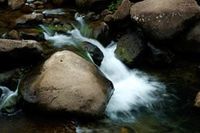The Power of Te

Cultivate the Power Within

Te is the power of Tao active in each individual. Chuang Tzu is one of my favorite philosophers and as a dream analyst, I can appreciate the wisdom of his 'butterfly dream.' One of the greatest lessons in Taoism is the ability to transcend any sense of separateness from what is unfolding around us. This world we see is very much a reflection of our inner world. If our inner garden is rich, the world is a place of abundance. If we operate from scarcity, all of experience is a confirmation of scarcity.
We are learning in a 24 hour cycle, but only tap 10 hours of this wisdom. When we dream, we are able to understand how everything is our reflection. We tap an awareness unlimited by ego's pursuit of safety and the status quo. We are more enlightened while dreaming. Even other people in our dreams are a mirror of what they represent for us, and how this quality is being adopted or discarded.
Chuang Tzu dreamed he was a butterfly. Upon waking he wasn't sure if he was a man dreaming of being a butterfly or a butterfly dreaming of being a man. To eliminate any separation in the dream/wake/dream cycle, we tap our 24 hour potential, which is key to igniting greater human potential. When I first began writing about dreams, people thought I was crazy. Today, most people recognize that dreams are teaching them something.
In my Taoist coaching, I teach people to understand the world they are creating, how to release extremes of judgment and how to move with the flow of Tao. This is the activation of te - the blueprint for our life purpose. When we remove the illusion of separateness, we move with the flow of Tao. It is only called te while we believe we are homeless. Going with the flow, te and Tao are one.
Chinese classical philosophy evolved from an exploration of the ancient idea of Tao, where te or “the natural power in me” develops as the individuating principle or the idea of Tao active in each creature.
Meng Tzu (Mencius 371-289 BC) described te:
“Such is the nature of this energy that it is immensely great and immensely strong; when it marries naturalness with truth, one dwells in peace and makes contact with it like a bubbling spring.”
The Taoists presented a Back to Nature philosophy for living. Since the order and harmony of nature was more meaningful than any system of thought constructed by man, one sought the simplicity of existence, and followed the natural Way. Observing how nature silently produced the myriad of plant and animal life without apparent effort, the masters applied this same sense of ease to daily life.
Experience is our teacher. From the perspective of growth, all things are led to fulfill their unique nature, and one does not fight the very force that gives this essence definition. Since the Way carves away unnecessary layers - polishes and refines te -the Tao te Ching is translated to mean a book that cultivates te when one follows Tao.
Wu wang, ‘not attached,’ and wu wei, ‘taking no unnatural action’ heightens the cultivation of te because we are more observant of how experience gives our unique nature definition. Rather than react, we observe and open to the teaching. Unattached to the past and not creating the response, the master said:
“I alone, am inactive and reveal no signs;
listless as though I have no home to go back to.”
The home we would have gone back to, is the paradigm that might trap the expression of our te. As our instinctual and natural connection to life, when cultivated alongside of fearlessness, te is like water that finds its own course, without any sense of barriers. Water can dissolve mountains and evens out, regardless of where it flows. The power of te connects us with the germinating power of life. Transcending the gate or ‘the illusion of obstacles,’ leads to a type of paradise in consciousness. This paradise is simply a place without boundaries. If you were to practice eliminating a sense of separation and judgment all together, all that would remain is the joy of finding yourself in an amazing place of wonder.
A change in perspective allows us to see obstacles as the banks of a great river that moves ever forward. Even when we fail, we are left with something that becomes necessary for our growth. When we re-evaluate the obstacle:“dimly visible, it only seemed as if it were there.”
Life has been committed to your success since the day you were born.
To take no action that is unnatural to our instinctive nature, and to act with original sincerity, something that is better cultivated in solitude, rather than through seeking the response of others, ensures that we meet with no resistance. We do not push our way into the world, rather we blossom from the center of who we are.
“The sheerest whiteness seems sullied. The great vessel takes long to complete." The great vessel holds our te as we travel through the river of life. "Te is not the virtue that develops from moral rectitude; it is the creative power that comes from spontaneous and natural expression. If the character is authentic, one becomes, quite by accident, authentically effective."
“Because this power is most true, within it there is confidence.” This confidence creates the magnetism that makes a great leader.
